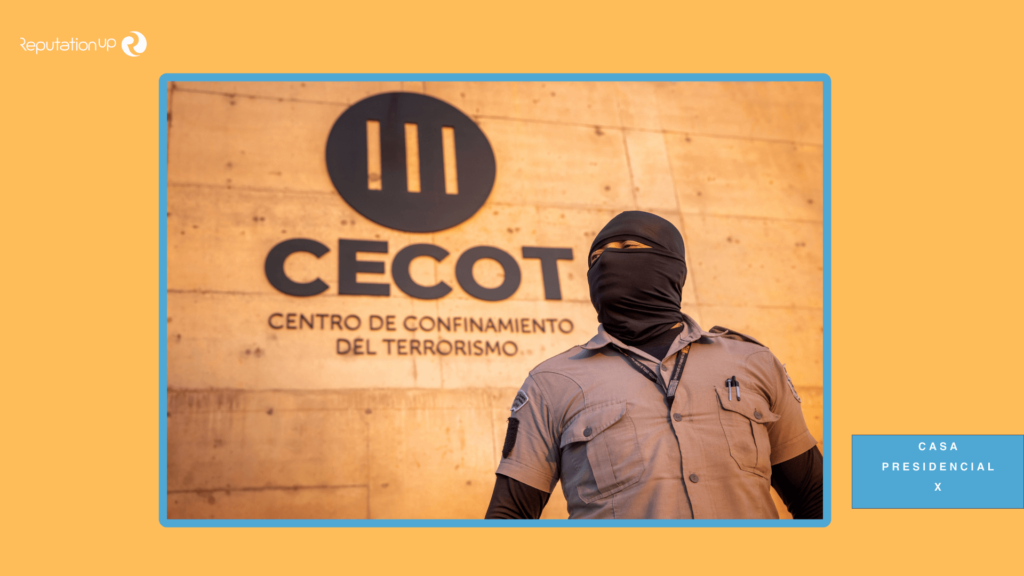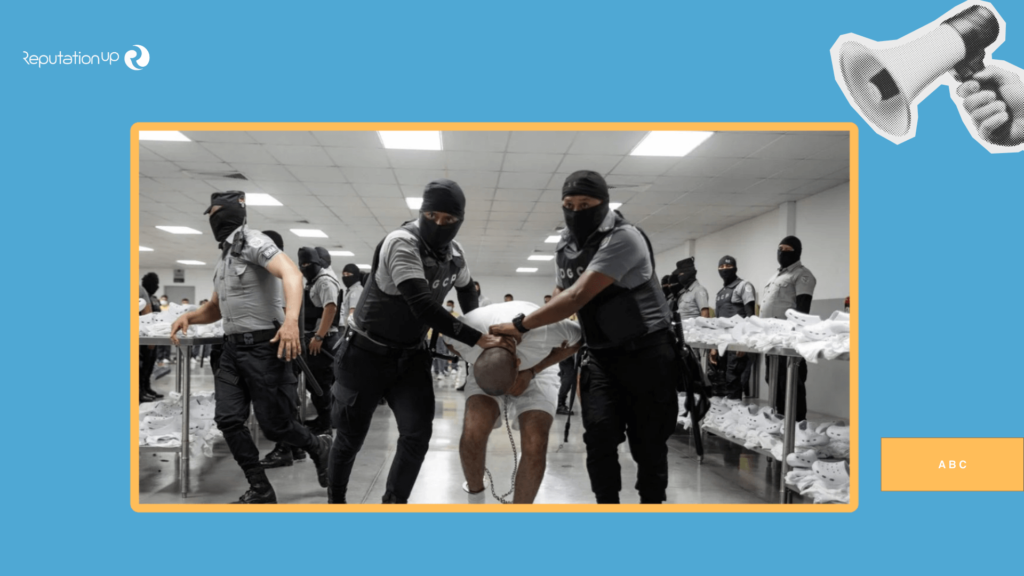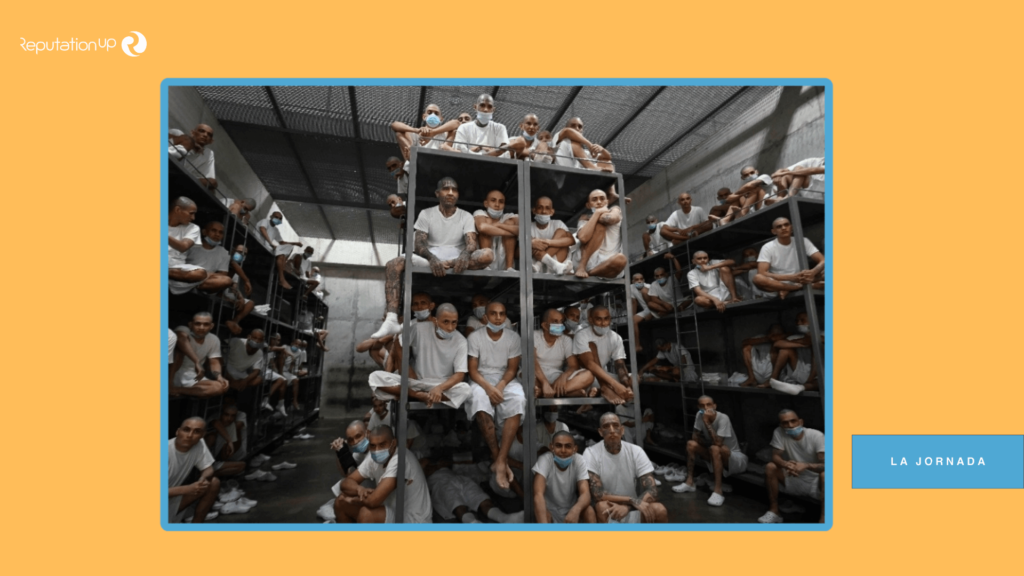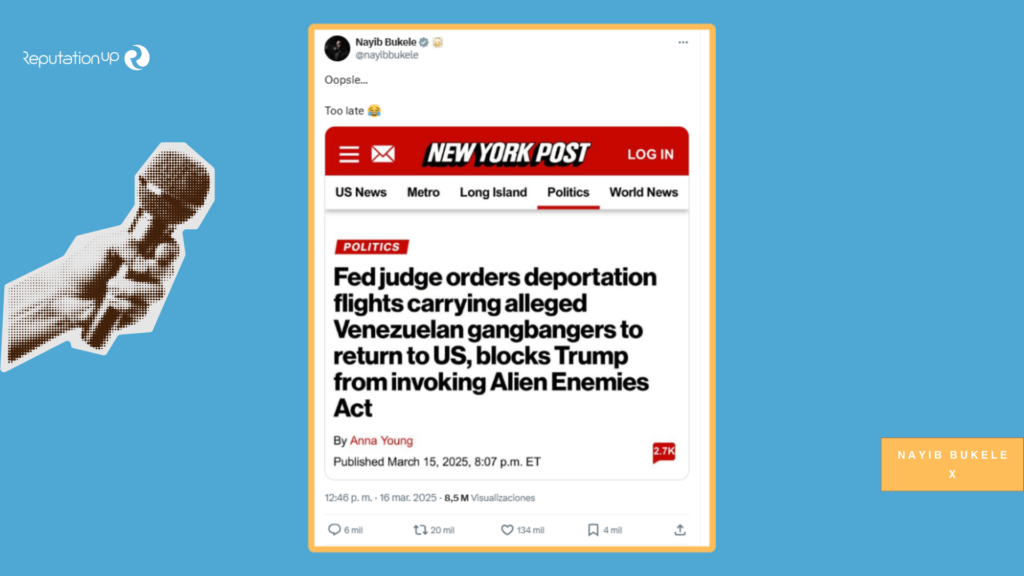A prison in the middle of nowhere. Migrants deported in silence. Agreements signed without transparency. And two presidents who have made security and immigration enforcement their banners.
What seemed like an isolated policy has become, in a matter of days, a global experiment.
A pact between Donald Trump and Nayib Bukele has led to more than 260 migrants being confined in Latin America’s largest prison, the CECOT ( Central American Center for Migrant Workers ), a mega-jail with no windows, no visits, and no trials.
The question is no longer what’s happening, but how far this model will go. And how it impacts the online reputation of the leaders who promote it.

The secret agreement: migrants by the millions
On March 3, without prior official announcement, El Salvador received 261 migrants deported by the United States , identified as members of the Tren de Aragua and MS-13 gangs . The first steps of this operation date back to February, when Trump and Bukele signed a $6 million agreement for El Salvador to house 300 alleged deported criminals in its maximum security prison for one year.
In return, Trump gained a political tool to toughen his immigration policy; Bukele gained resources and international visibility.
But soon, the first cracks emerged: there was no solid evidence against many of the deportees . Some had active asylum applications in the U.S., others entered the country legally. The only clue linking them to criminal gangs was a tattoo , a photo on social media , or a hand gesture .
A shocking example is that of Jerce Reyes , a former Venezuelan soccer player, accused of having a tattoo on his arm of a crown over a soccer ball.
For ICE, that was enough to consider him part of the Aragua Train. Reyes, who was awaiting his asylum hearing in April, will no longer be able to attend. He is locked up, without trial, incommunicado.

CECOT: the prison where everything remains silent
The Terrorism Confinement Center (CECOT) is the symbol of Bukele’s war on gangs. A mega-prison built in less than a year, with a capacity for 40,000 people, in an arid area of Tecoluca , 75 km from San Salvador.
Guarded by 600 soldiers , 250 police officers , and 1,000 guards , it is designed for absolute isolation . There are no windows. No visitors. No lawyers. Just concrete, steel, and cells with no privacy or ventilation.
At CECOT , conditions are extreme. The cells have a cement slab for beds , a separate toilet, a wire mesh ceiling, and access to water controlled from the outside. Inmates are kept in solitary confinement , monitored day and night by cameras and 15-meter towers. The punishment cells have little or no light, and those who enter them are handcuffed and left in the dark .

Violation of due process: Guilty for having tattoos?
The most serious issue is not the silence, but the arbitrariness . According to human rights lawyers, many deportees have no criminal record and have been detained simply because of their appearance or immigration history. An affidavit from the American Immigration Council reveals that ICE admits that the deportees have not committed crimes, but argues that this “makes them more dangerous” due to the lack of information.
A federal judge in Washington, James Boasberg , tried to stop the deportation with a 14-day restraining order.
He argued that the Alien Enemies Act , used by Trump to justify the expulsions, does not apply to individual migrants , but to situations of war between nations. The White House ignored the court order . Bukele celebrated the arrival of the detainees with a message on his X account : “Too late.”

Trump and Bukele: Security or Authoritarianism?
The pact between Trump and Bukele not only reshapes the approach to migration, but also proposes a new paradigm of authoritarian governance under the guise of security .
For Bukele, the agreement means economic reinforcements , U.S. political support , and a new step in his strategy to control power.
For Trump, it’s a show of strength , a clear message that he’s willing to do whatever it takes to fulfill his campaign promises.
Reputation management perspective , this episode represents a test of fire for both.
- Donald Trump , after the suspension of military aid to Ukraine, once again appears as the leader who imposes his agenda above judges, laws and allies .
This strengthens his image among his base , but alienates him from more institutionalist sectors and the international community. His use of the Alien Enemies Act , a 1798 law invoked only three times in history, has been considered a violation of due process and could erode his image of global legitimacy.
- Nayib Bukele , for his part, has projected strength, order, and discipline —attributes valued by many in El Salvador. But the cost is high: institutional isolation, allegations of human rights violations, and opacity in prison management .
His digital reputation has gone global, oscillating between admiration for his firm stance and criticism for the lack of legal guarantees. The fact that even Venezuela has called for the release of deportees reflects the growing international pressure.
What does Bukele gain from all this?
Beyond money, Bukele strengthens his narrative as a tough-minded leader against crime . U.S. Secretary of State Marco Rubio called him “the strongest security leader in our region.” This alliance allows Bukele to present himself as a strategic partner of the United States, something unprecedented for a Central American president in decades.
But he also gains a useful domestic distraction: in El Salvador, the state of emergency has been criticized for arbitrary detentions , lack of trials, and repression. Exporting the problem turns it into a success story. Moreover, Bukele strengthens his international image: the Guantánamo of the South , as some call it, positions him as a key player in hemispheric security policy .
The missing voices: human rights, judicial silence, and invisible migrants
Organizations such as Human Rights Watch and Cristosal have warned that this model could become a legal “gray area”: no judges, no convictions, no evidence.
The narrative being constructed: a Latin American Guantánamo?
The narrative constructed by the White House and the Bukele administration has overtones of authoritarian fiction: deportations without evidence, prisons without judges, and repression without transparency.
The application of centuries-old laws, the disregard for court orders, and the criminalization of poverty and migration are signs of a new political order that blurs the lines between justice and punishment.
What do you think?
- Are we witnessing a new era of bilateral agreements without judicial oversight?
- Can a prison become a symbol of political success?
- Does security justify the loss of rights?
- How does all this affect the global reputation of the US, El Salvador, and their leaders?
Leave us your opinion. This story isn’t over. And your voice counts too. 🗣️

